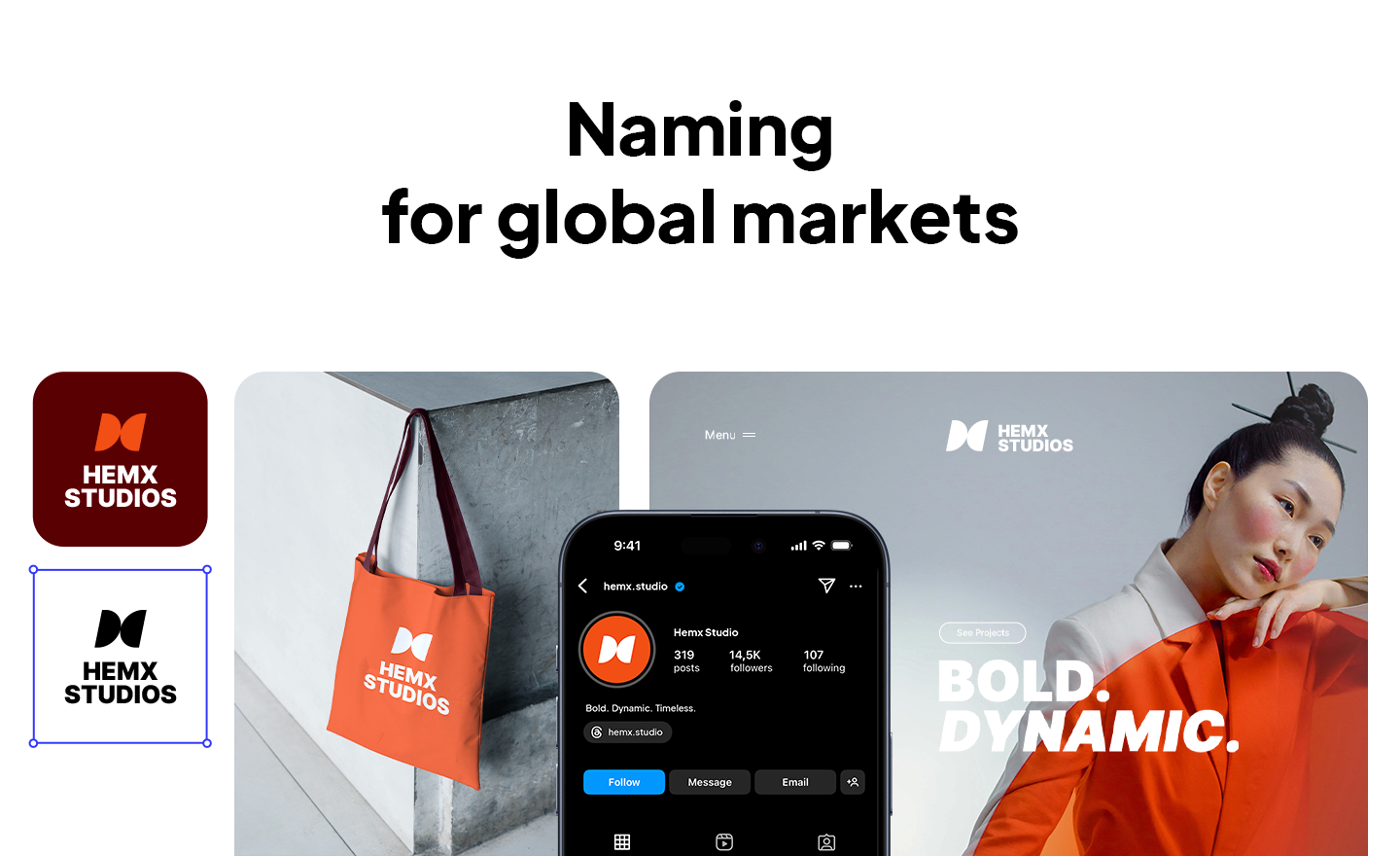Choosing a business name for global markets means looking beyond catchiness. Focus on linguistic clarity, cultural sensitivity, SEO visibility, and legal protection. Today, brands cross borders, and the wrong choice can confuse audiences, even lead to damaged reputation.
A strong global name communicates clearly, resonates emotionally, and supports discoverability across languages and search engines.
How to choose a name for global markets?
The best way to choose a name for global markets is to follow the steps that balance creativity with usefulness. People universally pay attention to these factors when choosing a name for global markets.
1. Linguistic clarity
A name that looks great on paper can fail fast if people around the world struggle to pronounce, spell, or understand it. It’s like ordering at Starbucks with an overly complicated name – you’ll rarely see it spelled right on the cup.
Keep words simple and universal. For example, the English word “gift” translates to “poison” in German, a mistake that could derail a brand’s credibility.
The takeaway: Test your name across major languages before selecting it, especially if it is in any language other than English, since English words are more widely recognized internationally. Chase clarity, rather than sophistication.
2. Cultural sensitivity
Even the smartest brand name can backfire if it clashes with cultural values, symbols, or everyday meanings. A name that resonates in one market may feel offensive, awkward, or even laughable in another.
For instance, when Pepsi entered China with the slogan “Pepsi brings you back to life,” it was mistranslated as “Pepsi brings your ancestors back from the grave.” Sounds offensive, doesn’t it? Such slip-ups hurt credibility and can make expansion much harder.
The lesson is simple: research cultural associations and test names with local audiences before launch. Colors, animals, gestures, and words all carry symbolic weight across cultures.
3. SEO & technical accessibility
A strong global brand name also needs to perform well online, which means corresponding with SEO best practices and technical accessibility. The name should be easy to integrate into a domain, adaptable for multilingual search, and optimized for how people in different regions look for products or services.
Take domain choices: using a local country-code TLD (like .de for Germany) can boost trust and visibility in that market, while global brands often choose .com for consistency. 10Web’s Domain Name tool can help you check availability across extensions, making it easier to secure the right version before your competitors do.
Keyword strategies also need localization – search habits vary widely, and a direct translation may miss how people phrase their queries. For example, someone in the UK might search for “trainers,” while in the US they’ll type “sneakers.”
4. Legal & trademark security
Even the most creative global name will fail if you can’t legally protect it. Trademark conflicts can block entry into new markets, cause costly rebranding, or lead to lawsuits that damage credibility. That’s why legal checks must be part of the naming process from the start if you aim to go global. How to deal with the legal and security stuff?
- Run a basic search first: Use free trademark databases like WIPO Global Brand Database, USPTO (United States), or EUIPO (European Union) to see if your name is already registered.
- Check domain and business registry databases: Beyond trademarks, search for your name in domain registries (10Web’s Domain Name Checker will help you) and local business databases.
- Hire a trademark attorney for deeper research: Professionals can run extensive clearance searches across multiple jurisdictions to identify not just identical names but also “confusingly similar” ones that could still pose legal risks.
- Register your trademark in key markets: File applications with local or regional offices where you plan to operate. After registering, you can use trademark watch services or set up alerts to track potential infringements. Be prepared to enforce your rights to maintain brand exclusivity.
5. Emotional & narrative power
A name is the first story your brand tells. When chosen thoughtfully, it can spark emotion, reflect cultural values, and create a sense of belonging that travels across borders. This is why some names, even if simple, manage to stay in people’s minds and hearts for decades.
Think of Nike, inspired by the Greek goddess of victory, which connects sport with triumph worldwide. Or Airbnb, short for “air mattress bed and breakfast,” which evolved into a narrative about belonging anywhere – a powerful emotional promise that works in every culture. These names go beyond function; they carry meaning that people want to be a part of.
The key is to ask: what feeling or story should my brand name evoke globally? It can be adventure, trust, innovation, or connection. Anchoring your name to an emotional or cultural narrative becomes an idea customers rally behind.
6. Professional validation & localization
Test every name with native speakers or cultural experts to catch hidden issues before launch. What feels clever in one market can sound awkward or offensive in another.
Go beyond translation by embracing localization: adapt spelling, units, visuals, and user experience to local norms. Even small details like date formats, currencies, or color meanings influence perception.
Name your business for global success
Naming for global markets takes strategy. A name must be clear across languages, culturally safe, optimized for SEO, legally secure, emotionally resonant, and properly localized to go viral worldwide. Skipping any of these steps risks confusion, offense, or lost visibility in key markets.
The payoff is worth it: a name that travels globally, protects your brand, and builds trust and recognition everywhere it appears. Choose wisely, and your business name becomes one of your strongest global assets.
FAQ
How to choose a name that works across cultures?
Choose a name that is simple, clear, and free of unintended meanings. Test it with native speakers in multiple countries to ensure it works across languages and cultural contexts.
What makes a brand name globally appealing?
A globally appealing name is easy to pronounce, emotionally resonant, and adaptable for search engines. It connects with people on a human level while staying relevant across borders.
How to avoid linguistic mistakes in naming?
Avoid slang, unusual spellings, or words that may have negative connotations in other languages. For example, “gift” in English translates to “poison” in German, which could harm your brand.
What role does translation play in brand names?
Translation matters, but localization matters more. Instead of directly translating, adapt your brand name and message so they feel natural in each market.
How to test a name in multiple markets?
Run surveys with native speakers, check cultural associations, and analyze SEO keywords for different regions. Small-scale testing helps prevent costly mistakes later.
How to balance local relevance with global reach?
Choose a name that feels universal but can be localized with small adjustments, such as spelling or visuals. This way, you stay consistent while respecting local norms.
How to handle pronunciation differences?
Keep names short, simple, and phonetic whenever possible. If your brand name is hard to pronounce, consider slight adaptations or clear guidelines to help global audiences say it correctly.











